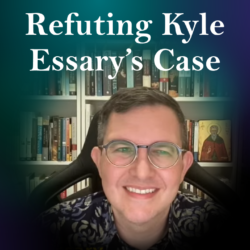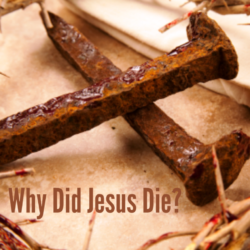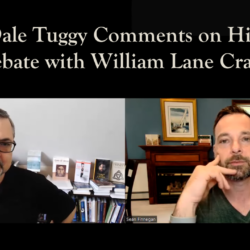This is part 1 of the Calvinism Debate
Today we begin an extended series on Calvinism and Arminianism. For those of you not familiar, Calvinism, named after John Calvin (d. 1564), holds that God sovereignly chooses and effectually saves all whom he decides to save based on his predestined will whereas Arminianism, named for Jacobus Arminius (d. 1609), asserts that people freely choose to accept or reject the gospel message that God graciously offers to all. Traditionally, Calvinism breaks into five major points, summarized by the acronym, TULIP, which stands for the following:
- Total Depravity
- Unconditional Election
- Limited Atonement
- Irresistible Grace
- Perseverance of the Saints
In this episode we begin by laying down the framework for future discussions. Subsequent episodes will each take up one of these five points of Calvinism.
Holding the Arminian position is Jacob Rohrer, a graduate of the Atlanta Bible College. At the time of this recording he served as the Lead Worship Pastor of Living Hope Community Church in Latham, New York. Now he serves as the Assistant Pastor and Worship Leader at Lawrenceville Church of God in Springfield, Ohio.
On the Calvinist side, Blake Cortright graduated from Regent University in Virginia. He serves in missions work to the Democratic Republic of the Congo and leads worship at Living Hope Community Church in Latham, New York. Cortright also wrote and directed The 46ers, a documentary about the high peaks in the Adirondacks of New York State.
Sean Finnegan is the moderator. He serves as the Associate Pastor at Living Hope Community Church and has degrees in theology (B.A., Atlanta Bible College) and church history (M.T.S., Boston University). You can find out more about Sean here.
Our aim in this initial episode is to briefly discuss the origins of Calvinism and Arminianism, as well as their predecessors. Additionally we urge listeners to have an open mind going forward, regardless of which side of the issue you are approaching it from. Don’t confuse the value of an idea with the person’s name associated with it (the genetic fallacy). Instead measure the theology against scripture, logic, and life experience. Pray and ask God to help you understand his book.
Here is proof that discussing deep theology and leading worship are not mutually exclusive. In this shot, Jacob is on the drums and Blake is playing guitar at Living Hope Community Church.
Subsequent episodes will be audio only and appear here each Thursday at 8pm EST, starting on May 31, 2018 and following.
—— Links ——
- See Jacob Roher’s interview on the gospel or watch his sermon, “How to Treat Other Christians.” His email is thekingdomgospel@outlook.com
- See Blake Cortright’s podcast on spiritual disciplines as well as how to quit pornography. Follow him on Twitter @blakecortright
- Check out Living Hope Community Church and Lawrenceville Church of God
- Intro music: Jazzy Frenchy by bensound.com. Licensed under Creative Commons: By Attribution 3.0 License.










I’ve been listening to Restitutio for a while and look forward to the rest of this series. I also appreciate the preparation that Sean, Jacob, and Blake have done or will do for this series, because it is certainly a major investment of time and energy. That said, there is one overriding historical error in this podcast that needs corrected. The term “Arminianism” should be not conflated with just any soteriology that emphasizes synergism, libertarian free will, conditional election (e.g. divine election unto salvation on the basis of foreseen faith), or other related topics. One branch or stream of the Reformation was the Reformed wing (as distinguished from the Lutheran, Anglican, and Anabaptist wings), and Arminianism is a specific tradition *within* that Reformed wing, as Jacobus Arminius sought to promote his — that is, the Remonstrants’ — soteriological views within the Church of Holland. Accordingly, it’s not correct to say, for instance, that Philip Melanchthon caused Lutheranism to switch over from Calvinism to Arminianism. I understand the underlying truth here — that Melanchthon caused the theology of the Lutheran churches to shift from a more predestinarian or theological-determinist bent to one that is more synergistic — but it is important to use our terminology precisely when attempting to arrive at theological truth on matters like these. (Similar things can be said for the usage of “semi-Pelagianism,” which should not be conflated with synergism or Arminianism.)
The reason this is important is because it’s easy to fall into a “system fallacy,” where we unduly suppose that certain segments of a historical theological system are inextricably joined. For example, many Calvinists promote all the points of TULIP as mutually entailing one another. There may be logical entailment relations between a few of them (e.g. total depravity and irresistible grace), but it is simply false that the all the points of the system stand or fall together. Consequently, it’s important that we understand the wide variety of ways in which different particular doctrines can be clustered together in a coherent system. For example, it could be that unconditional election is true but perseverance of the saints is false (as Augustine believed). Or, there could be a modified version of perseverance of the saints, where believers can apostatize but are promised by God to return to saving faith prior to their deaths.
My overall point is this: Arminianism and Calvinism are two specific theological positions within the Reformed wing of Reformation (that is, Protestant) Christianity. They each have specific theological tenets that do not all mutually entail one another, and it is indeed possible to have a hybrid theological position that draws from both of them, to some degree, without contradiction. Therefore we should be careful not to speak of any synergist view as “Arminian” (which Roman Catholics and Lutherans, among others, would not appreciate), and — in the upcoming podcasts — we should strive to identify the particular doctrine whose biblical basis we are discussing, rather than assuming a disproof of some unrelated element within the broader theological system constitutes a disproof of every tenet within that system.
Hi Ben,
Thank you for your clarifying comment and thanks for listening! I apologize for misrepresenting the Lutheran view. Since the main focus of this series is on studying TULIP itself and engaging with the doctrine’s of grace in the classic Calvinistic system, most of my research is to that end and I misunderstood the Lutheran soteriology.
And I agree with you – we shouldn’t discredit a theological system on the basis of an unrelated element somewhere else; thank you for your patience and grace in writing all of this out!
Cheers, brother!
Hi Sean, Thank you for organising this cordial discussion/debate looking forward to this series.
Its a great ministry which helps with such a variety of interesting and important topics.
Blessings to Blake and Jacob.
Much appreciated,
Aryhu
I will be following this Calvinism vs Arminianism discussion with great interest.
Deciphering the relationship between God’s sovereignty and man’s will isn’t as easy as it might sound. It takes a lot of effort to switch back and forth between the positions, trying to sympathetically understand the Scriptures from each point of view.
Both the Calvinist and the non-Calvinist (not all non-Calvinists would call themselves Arminians) can make logical and theological sense. Both will point to many verses that seem to support their position. The non-Calvinist position has the advantage of being easier to grasp intuitively. But when explained on its own terms, the Calvinist position is equally robust.
I really appreciated the respectful tone used by both Jacob and Blake (and, of course, Sean) in the introductory session. This is a topic that has the potential to divide friends, families, and churches. So as interested as I am in coming to the correct theological position (and I’m very interested), I am more interested in building one another up in love and reflecting the unity that is ours in Christ.
Thanks for your kind words Paul! I look forward to seeing how folks respond to the remaining five episodes as we get deeper into the scriptural basis for the doctrines of grace and for opposing non-calvinist views. I really enjoyed working on this series with Sean and Jacob and grew deeper in my own personal faith, as well as in my relationship to these two brothers in Christ.
God Bless you!